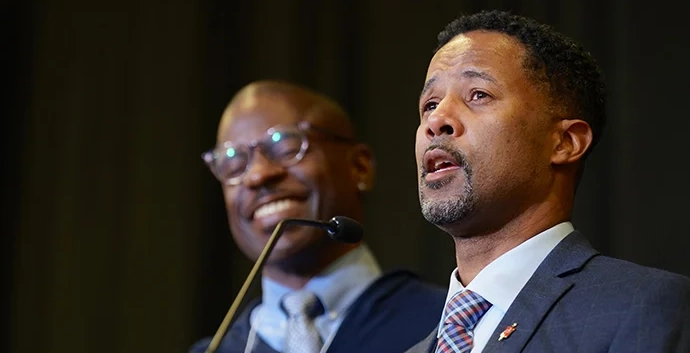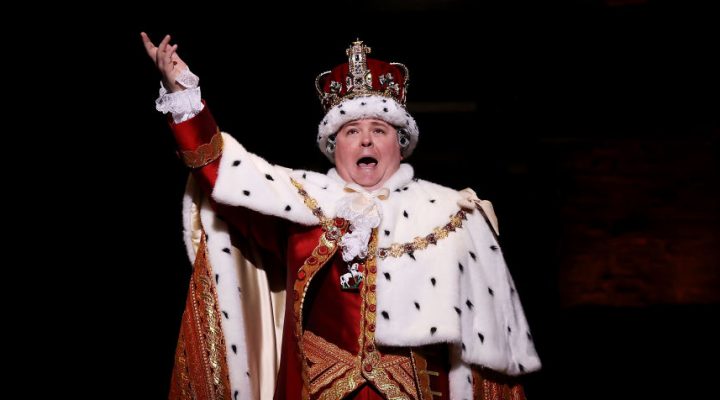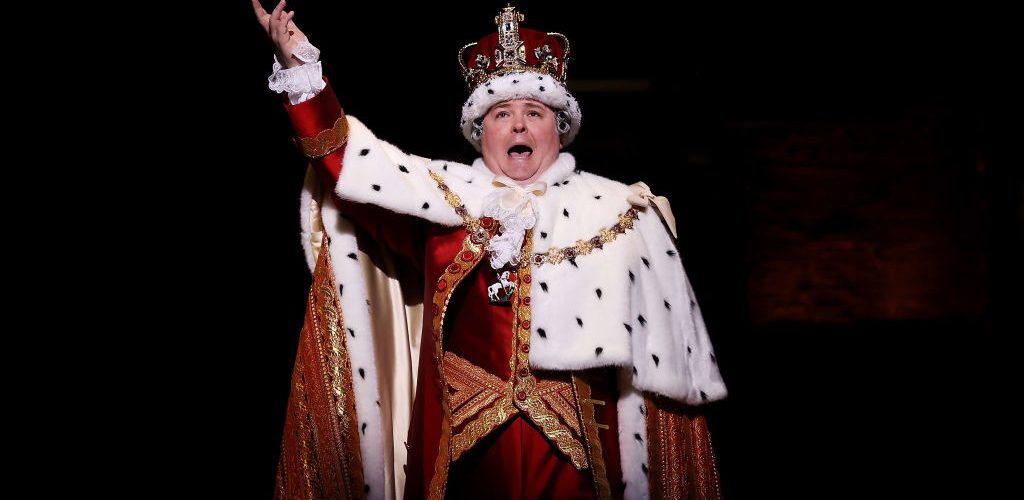Not even the sainted hymnist of Methodism, Charles Wesley, could sing better of the United Methodist Church’s future than King George III in the musical Hamilton: What comes next?
Regrouping after decades-long conflicts over human sexuality, declining membership, decreased revenues and Covid-spawned postponements, the UMC’s split resembles the American Revolution in spirit if not in armed action. Portents for a sustainable UMC future are as murky as those of the early United States.
The actions of this year’s historic General Conference continue to reverberate around the worldwide denomination, whose former count of 12 million members is diminishing rapidly because of conservative defections in Eurasia and Africa.
The departures’ cause is simple: Delegates to the 2024 General Conference, held April 23-May 3 in Charlotte, N.C., voted overwhelmingly to remove all the UMC’s anti-LGBTQ language and penalties.
Conservative United Methodists especially agonize over the church’s new definition of marriage as a sacred union between a woman and a man or between two adults of consenting age. Ironically, a delegate from Zimbabwe proposed the new definition, reportedly more to condemn an African cultural practice of child marriage than to endorse same-sex or nonbinary unions.
Nonetheless, the marriage definition, added to guidelines for Christian living known as the Revised Social Principles, served as a tipping point in the UMC’s decades-long dispute over LGBTQ acceptance. Delegates voted to remove all church penalties based on a guideline — not a doctrine — adopted in 1972, “the practice of homosexuality is incompatible with Christian teaching.”
… the misperception that the UMC has become a “gay church” — or at least a church that doesn’t overtly condemn LGBTQ relationships — has resulted in more turmoil and disaffiliation.
Although United Methodist bodies outside the United States long have had the privilege to adapt the church’s collection of policies and doctrine, the Book of Discipline, to their cultural contexts, the misperception that the UMC has become a “gay church” — or at least a church that doesn’t overtly condemn LGBTQ relationships — has resulted in more turmoil and disaffiliation.
The three largest departures thus far have been UMC bodies in Eurasia, Côte d’Ivoire (Ivory Coast) and Nigeria, with Liberia and Zimbabwe also conflicted.
The Eurasia area’s departure was sanctioned by the General Conference in May after heartfelt statements from two European bishops, Harald Rückert and Eduard Khegay. Both leaders affirmed a cordial negotiation of Eurasia’s disaffiliation “for reasons of conscience” regarding homosexuality. Under Khegay’s leadership, Eurasia encompasses 66 churches in Russia, Belarus, Kyrgyzstan and Kazakhstan with 1,123 members, according to most recent church data. The four regions plan to form an autonomous Christian Methodist Church.
The Côte d’Ivoire Conference’s May 28 vote to leave the UMC came as a surprise. Côte d’Ivoire was the largest African UMC unit, claiming more than 1 million members, although that amount is disputed by an official record totaling more than 600,000 members. Côte d’Ivoire joined the UMC in 2008 and intends to revert to its former status as an autonomous church.
More expected was the departure of former UMC Bishop John Wesley Yohanna of Nigeria. Yohanna announced July 29 he and his cabinet had joined the conservative breakaway denomination, the Global Methodist Church.
Yohanna’s administration had been plagued with turmoil more than three years, since his dismissal of former assistant Ande I. Emmanuel. Along with other Nigerian UMC leaders, Emmanuel contended Yohanna misspent church funds and used secular means such as law enforcement to quell dissension.
The UMC Council of Bishops said it will appoint a team to oversee Nigerian United Methodists and has asked churches to withhold mission contributions until a new administration is in place.
Meanwhile, in Liberia, Bishop Samuel J. Quire fended off demands for an immediate session to vote on leaving the UMC. This push has been led by United Methodist pastor and educator Jerry Kulah, coordinator of the Africa Initiative program of the “traditionalist” Wesleyan Covenant Association, which has been a primary disaffiliation fomenter in the United States. Quire said he saw no need for a special meeting when the Liberia Annual Conference is scheduled to hold its yearly session in January.
Still uncertain remains the fate of United Methodism in Zimbabwe, where homosexual practice is illegal. Sometimes-violent Christian protests against gays, including vandalism of a gay-advocacy organization, have erupted in recent weeks.
So, what of the “rebellious” United Methodists in the United States? U.S. United Methodists recently completed their jurisdictional conferences with a complicated selection and assignment process for bishops. The UMC in the United States is divided into five multi-state jurisdictions because of mergers in 1939 and 1968.
Typically, U.S. bishops are elected once every four years and serve for life, unlike bishops outside the U.S., who often have term limits.
Typically, U.S. bishops are elected once every four years and serve for life, unlike bishops outside the U.S., who often have term limits. This year, however, a body known as the Interjurisdictional Committee on the Episcopacy proposed reducing the number of active U.S. bishops from 39 to 32 for financial reasons. To reach this goal, the committee proposed no new bishops be elected, and General Conference delegates approved the idea.
However, it turned out that no active bishop was “willing or able” to transfer into the 12-state — plus U.S. territory Guam — Western Jurisdiction as required by the Book of Discipline. Consequently, Western delegates elected two new bishops — longtime missionary and church administrator Sandra K. Olewine and seminary professor Kristin Stoneking.
Stoneking’s election proved historic. A married lesbian, she is the third LGBTQ bishop chosen by Western delegates and the first to be elected legitimately under church law. Retiring Bishop Karen P. Oliveto was the first LGBTQ bishop elected in violation of church law in 2016. Active Bishop Cedrick Bridgeforth was the second married gay pastor chosen in a special election in 2022, again against UMC policy. Oliveto’s and Bridgeforth’s elections have been disputed but never rescinded.

Bishop Cedrick Bridgeforth addresses the delegates, guests and his new episcopal colleagues, shortly after his election. His husband, Christopher Hucks-Ortiz, stands at his side. (Photo by Patrick Scriven for the Western Jurisdiction UMC)
While the Western Jurisdiction was electing bishops through what delegates claimed was a nonpolitical process of spiritual discernment, delegates to the four other jurisdictions juggled two major issues:
- How to assign fewer bishops across wider church regions
- How to convince rank-and-file United Methodists the denomination remains a “big tent” where diverse theological viewpoints are welcomed, even after the departure of 7,500 “traditionalist” congregations that don’t accept LGBTQ sexuality.
Achieving the first task resulted in two models, assigning bishops across jurisdictions and assigning more bishops to lead multiple annual conferences.
Southeastern and Northeastern Jurisdictions will share Debra Wallace-Padgett, who will oversee both the West Virginia (Northeastern) and Holston (Southeastern) annual conferences. Holston comprises churches in southeastern Tennessee, southwestern Virginia and northwestern Georgia along the valley of the Holston River.
Western and South Central jurisdictions will share Carlo A. Rapanut, who will administer the New Mexico (South Central) and Desert Southwest (Western) conferences. Desert Southwest covers Arizona and southern Nevada, including Las Vegas.
South Central Jurisdiction achieved a first by assigning Laura Merrill to lead Arkansas, Oklahoma and Oklahoma Indian Missionary conferences, making her the first female bishop to preside in Oklahoma. Delegates also approved unification of three annual conferences — North Texas, Central Texas and Northwest Texas — into a single regional unit named Horizon Texas.
The new Horizon Texas conference illustrates the geographic challenges facing bishops in their new alignments. The east-west axis of the new conference extends from Paris, Texas, to New Mexico at more than 751 miles, while the north-south axis runs from Oklahoma to Round Rock, Texas, more than 478 miles. Ruben Saenz Jr. will administer the new region, whose headquarters city has yet to be determined. The new region will hold its unification conference in Abilene, Texas, Sept. 28.
North Central delegates approved a “tag team” arrangement with Iowa’s Kennetha Bigham-Tsai and Michigan’s David A. Bard sharing administration of the Illinois Great Rivers Conference, which covers the state south of Chicago. The Windy City’s Northern Illinois Conference has been linked with the Wisconsin Conference under the supervision of Dan Schwerin, while two Ohio conferences, East and West, are united into a single episcopal area supervised by Hee-Soo Jung.
In the Northeastern Jurisdiction, in addition to sharing Wallace-Padgett, delegates approved linking the New York Conference with the New England Conference under the administration of Thomas Bickerton. Northeastern previously had paired Baltimore-Washington and Peninsula-Delaware conferences under LaTrelle Miller Easterling and Greater New Jersey with Eastern Pennsylvania, whose new episcopal leader is Cynthia Moore Koikoi.
Southeastern delegates aligned two Georgia conferences, North and South, together under Robin Dease’s supervision. Tennessee-Western Kentucky, Kentucky and Central Appalachia Missionary conferences will be supervised by David Graves, and Alabama-West Florida and North Alabama by Jonathan Holston.
With new episcopal assignments in place, United Methodist leaders face the more daunting task of leading the trauma-scarred denomination into a hopeful future.
In a statement released July 22, the churchwide Council of Bishops said the body aims to craft a “more agile and efficient” denomination with its new alignments. Click here to see full list of U.S. bishops’ assignments.
With new episcopal assignments in place, United Methodist leaders face the more daunting task of leading the trauma-scarred denomination into a hopeful future. Delegates to the 2024 General Conference, hailed for its cordial civility and cooperative spirit, are trying through local speaking engagements to assure clergy and church members the leaner UMC is a less-meaner church than in the past.
Perhaps the best example of the UMC’s new spiritual aim came from scholar Paul W. Chilcote’s “special topic” presentations to the North Central Jurisdiction. According to an article by Iowa Conference communicator Liz Winders: “Chilcote focused on practical theology in the Wesleyan tradition, specifically addressing how to teach the concept of love as central to … United Methodists’ faith.
“Chilcote emphasizes the interconnectedness of key spiritual practices — prayer as the foundation, scriptural engagement, Christian fellowship and the Eucharist (Lord’s Supper) as nourishment for mission. He argues that these practices are not merely inward-focused but shape believers into loving individuals who serve the world.
“‘My friends, engaging in these spiritual practices, praying, immersing ourselves in Scripture, having religious talk, conversation, in fellowship with others, and sharing around the table. These are the places where we learn how to love,’ said Chilcote.”
With continued rough seas on its horizon, the United Methodist Church will need a “whole lotta love,” as a rock song goes, to navigate a tsunami of changes.
Related articles:
Top issues for United Methodists’ Global Assembly taking shape
As delegates prepare for UMC General Conference, advocates outline their appeals
UMC General Conference removes much of LGBTQ restrictions in consensus vote
Here’s why UMC delegates will face new twists in electing bishops this week


